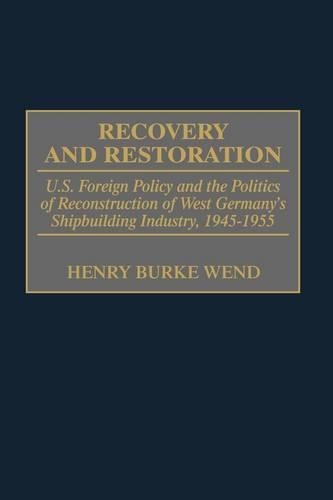
Recovery and Restoration: U.S. Foreign Policy and the Politics of Reconstruction of West Germany's Shipbuilding Industry, 1945-1955
(Hardback)
Publishing Details
Recovery and Restoration: U.S. Foreign Policy and the Politics of Reconstruction of West Germany's Shipbuilding Industry, 1945-1955
By (Author) Henry B. Wend
Bloomsbury Publishing PLC
Praeger Publishers Inc
30th July 2001
United States
Classifications
Tertiary Education
Non Fiction
International relations
Manufacturing industries
European history
327.7304309044
Physical Properties
Hardback
288
Width 156mm, Height 235mm
567g
Description
Because of Germany's strong reputation in naval construction, the Allies slated the shipbuilding industry for dismantling after 1945; however, by 1955, West German shipbuilders had regained their place among the world leaders in this industry. This study traces the reconstruction through the labyrinth of Cold War diplomacy, foreign aid programs, and West German politics. By linking the histories of U.S. foreign policy, German business, and postwar Americanization, Wend demonstrates not just the impact of U.S. policy on West German reconstruction, but also the influence of local actors on the direction, implementation, and success of U.S. policies. The recovery of German shipbuilding meshed well with most of the Truman administration's critical foreign policy initiatives, including the Marshall Plan. As American commitments became globalized, the U.S. relied heavily on West German actors and their institutions for the successful implementation of its policies. In shipbuilding, this reliance strengthened the role of the industrial association, the vertical integration of shipyards with Ruhr industries, and awakened opposition of British and American interest groups. Although U.S. policies failed to alter this industry's structure, West Germans did accept the American production model in the reconfiguration of individual shipyards in the 1950s.
Reviews
.,."should be considered by all intersted in postwar German and European reconstruction."-Business History Review
...should be considered by all intersted in postwar German and European reconstruction.-Business History Review
[a]llows important insights into the different policy toward German shipbuilding in the years before and after the Korean War and during the first years of the Cold War.-International Journal of Maritime History
"allows important insights into the different policy toward German shipbuilding in the years before and after the Korean War and during the first years of the Cold War."-International Journal of Maritime History
..."should be considered by all intersted in postwar German and European reconstruction."-Business History Review
"[a]llows important insights into the different policy toward German shipbuilding in the years before and after the Korean War and during the first years of the Cold War."-International Journal of Maritime History
Author Bio
HENRY BURKE WEND is Assistant Professor in the College of General Studies at Boston University and is Faculty Associate of the International History Institute. He has also been a visiting assistant professor of U.S. History at the University of Missouri-Columbia and a visiting scholar at the University of Bielefeld in Germany.
